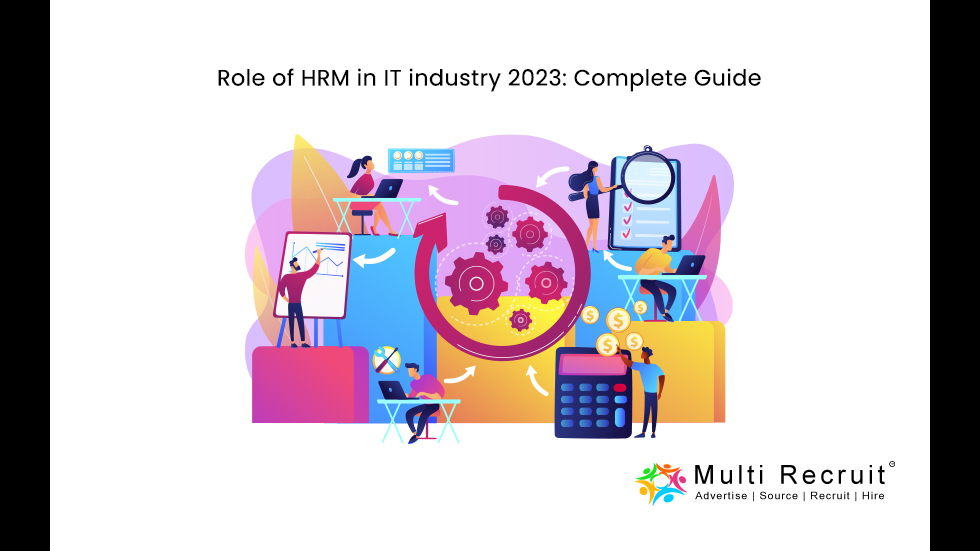There is always a competent HR department in every successful company. Providing a link between employees and management, it is an essential component of any company. Employee learning software, performance tracking software, scheduling software, and monitoring software are all used by organizations to manage HRM functions efficiently. In addition, payroll, insurance, tax compliance, and staff analysis are handled by it.
The company’s human resource department recruits and develops top talent to help it achieve its goals. In order to boost employee productivity and meet your company’s goals, HRM functions require the development of policies and implementation of training and development opportunities.
Recruitment and payroll processing are just two of these functions. A company’s human resources department handles all activities affecting its employees, from basic functions to strategic decisions.
What are the key points of HRM in IT industry 2023?
The key points of HRM in IT industry 2023 are:

Organizations must attract and hire top talent to stay ahead of the competition in the highly competitive IT industry. In 2023, HR professionals employ innovative strategies for sourcing, assessing, and selecting candidates. In addition to streamlining recruitment processes, identifying suitable skillsets, and assessing candidates’ technical and soft skills, they use technology to streamline recruitment processes. As well as creating a positive candidate experience, HRM plays a critical role in employer branding.

Because of the high demand for IT talent, organizations struggle to retain skilled professionals. In order to maintain employee motivation, engagement, and satisfaction, HRM professionals implement retention strategies. Their responsibilities include identifying and resolving potential issues, promoting work-life balance, providing opportunities for growth, and fostering a supportive work environment. Taking proactive measures to retain employees will increasingly depend on employee feedback and data analytics in 2023.

Keeping up with the rapidly evolving IT industry requires continuous learning and development. It is the role of HRM professionals to identify skill gaps, design training programs, and facilitate learning opportunities. Various HRM approaches will be employed to enhance employee skills and knowledge in 2023, including e-learning platforms, mentoring programs, and collaboration tools. Employees are also encouraged to keep up-to-date with emerging technologies and industry trends.

In order for individual goals to be aligned with organizational objectives, effective performance management is essential. As the IT industry transitions away from annual performance appraisals towards more agile and continuous feedback mechanisms, HRM in 2023 will become more agile and continuous. To improve employee performance and productivity, HRM professionals establish goals, provide real-time feedback, and conduct regular performance discussions. Recognition and rewards are also given to high performers, creating a culture of appreciation.

In the IT industry, HRM focuses on creating an inclusive and diverse workforce. A diverse talent pipeline, fair hiring practices, and inclusive work environments will be a priority for HRM professionals in 2023. Diversity training programs, targeted recruitment initiatives, and employee resource groups are some of the ways they promote diversity. Inclusion fosters innovation, creativity, and problem-solving within organizations through the use of diverse perspectives.

Change is an integral part of the IT industry, and HRM is crucial to managing organizational transformations. Change management initiatives are being led by HRM professionals in 2023. They are also supporting employees during transitions and ensuring effective communication. During a transition to new technologies, processes, or structures, they assist stakeholders in mitigating resistance to change, maintaining employee morale, and facilitating a smooth transition.
Roles of HRM in IT industry
The purpose, strategy, and values of an organization are defined and maintained by HRM functions.
The HRM functions include evaluating jobs and designing jobs, recruiting, selecting, training, rewarding, maintaining workplace relationships, managing compensation, controlling production, and managing institutional relations.
HRM functions also include:
Assuring complete efficiency by creating a solid institutional framework.
Achieving predetermined organizational goals.
Maintaining talent management for diverse divisions in a timely manner.
A company’s HR policies should be aligned with its goals.
Keeping employees motivated and motivating them.
Promoting diversity in the workplace.
Increasing employee trust.
Collaborating and integrating.
Enhancing retention by maintaining employment stability.
Providing ongoing training and development to staff.
Paying employees fairly, providing them with benefits, as well as other perks that’ll satisfy them on the job.
Work with employees to maintain a strong management-employee relationship.
Identifying future recruitment requirements and demands.
Updating safety guidelines and instruction manuals on a regular basis for employees and executives.
Career development methods that ensure fairness and success in management promotion processes.
Conclusion:
In an IT industry that is rapidly evolving, HRM has become more strategic and vital. Recruiting, retaining, and developing talent is the primary responsibility of HRM professionals in 2023. In the digital age, organizations must be equipped with the skills and capabilities to thrive if they are to foster a culture of innovation, foster employee engagement, and maintain a culture of innovation. Organizations can leverage HRM’s potential to attract talent by understanding its significance in the IT industry. To know more about contact Multi Recruit.

